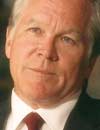- John Carroll
Former editor, Los Angeles Times - Mark Corallo
Former director of public affairs, Justice Department - Bill Keller
Editor, The New York Times - Eric Lichtblau
Reporter, The New York Times - John McLaughlin
Former deputy director, CIA
And the [SWIFT] financial tracking program? [Was that story valuable?]
The financial tracking was a little less clear-cut than the wiretapping, because we really don't have much in the way of rights to our financial privacy. I think the IRS could probably give a more coherent account of my finances than I could. That privacy is long gone, and we accept it. ...
I actually think it was the right thing to disclose that. I think it told our terrorist enemies nothing that will change their behavior. They knew our government announced that we were using all available means to track their finances, their international money transfers and so on.
... How do you describe the outpouring of invective and attack that's taken place since the [SWIFT] financial terrorism surveillance program was revealed [by The New York Times]?
I think that the public and the politicians have had enough. In this particular case, with this SWIFT program being divulged, people got a sense that real harm was done in divulging it; that there were no legal issues; ... that it was completely legal; that it was an incredibly helpful tool in the war on terror. And the public looked at it and said: "Hey, who gives you, [New York Times executive editor] Bill Keller, the right to determine what makes me safe? You just made me less safe." I think that's what did it.
But in this case, The New York Times took at least four or five months before they published. ... The SWIFT group itself had questions about its legality a number of times. And as far as we know, the operation continues. ... So where's the damage?
The damage is in divulging secrets to our enemies. The damage is that they watch us closely. The damage is that they know -- or they want to know -- everything we're doing, and it's in our interests to keep everything that we possibly can secret from them. I think the public looked at this one and said there was no good reason: It didn't involve American citizens; there were no constitutional issues here. This is strictly arrogance by what they see as the elite media, The New York Times.
But there are American citizens involved in some of the surveillance and the financial transactions. They're not excluded.
Well, they are, but it's very targeted, as I understand it. Again, I don't know anything about the program, but from what I've read, it's a very targeted program. But again, this is a program that Congress was briefed on in full only once the administration knew that The New York Times had the story. Well, interestingly enough, when you look at the fallout from this story, you didn't hear any of the Democrats screaming at the administration over this one. ... They didn't feel that they could defend The New York Times on this one, and that says a lot.
I think that Bill Keller's public explanation lit the fire even more. It was this sort of, "Well, even though we knew that there were really no concerns, hey, everybody knew about it anyway, so we're going to publish it." Well, most people in America didn't know about it, and I think people were offended by it. I think they just found it to be arrogant. ...
[What about] the president of the United States saying it's a disgrace; congressmen saying The New York Times should be prosecuted for treason; the attorney general saying that the Espionage Act may come into effect here? ... Quite frankly, it looks like a political strategy.
There's always going to be a good, healthy amount of politics in this, and no Republican has ever gone broke attacking The New York Times. Then again, The New York Times editorial page has never gone broke attacking a Republican. ...
And then the SWIFT [terrorist financial surveillance program] story. That resulted in even greater outcry.
Clearly when we talked about the SWIFT story we anticipated that they would come after us. I don't know that we anticipated they'd come out after us quite as noisily as they did. But we expected that it would be controversial. ...
Somebody asked Congressman Peter King, a Republican from New York who was one of the people who was calling us traitors and urging that we be prosecuted in some way after the banking story, "Why are you so angry at The New York Times?" And he sort of looked at the camera with that kind of sly smile and said, "Recidivism." Basically, this is the second time. We were repeat offenders, and that's why the anger was so much greater the second time around. That's probably part of it. ...
You're smiling, but what they really are saying is that you're arrogant, elitist, want to do things your own way, and don't understand the rest of America, which is much more patriotic than you are. ...
We're not agnostics on the subject of terrorism. We take that very personally indeed. But I don't buy the notion that it's patriotic or -- or humane to always take your government at its word. ...
In this case, you didn't have the question of legality.
... There are some officials in Europe, where the banking surveillance program has its hub, who have questioned the legality of the program under European law, which isn't nothing. But it's true that in the case of domestic eavesdropping, there were very strong feelings that the program exceeded the legal authority of the president. Those feelings were much less strong in the case of the banking story.
[There are] several reasons for writing about it, but I think the main one, again, is this context: the concentration of executive power. This is a program that was taking place without the kind of congressional oversight that you would normally expect. There were some members of Congress who knew about it; there were quite a few members of Congress who normally would have been apprised of a program who did not know about it. ...
In this particular instance, there were meetings between New York Times editors and the administration, in addition to reporters.
Yes. I spent a little more than an hour with the secretary of the treasury, and I had a phone call from John Negroponte, [director of national] intelligence. I think some of our other editors had other conversations.
... Didn't [9/11 Commission Co-Chair] Lee Hamilton call you?
Lee Hamilton did not call me. I think he talked to Phil Taubman. We got calls, as far as I know, from three people: from [9/11 Commission Vice Chair] Lee Hamilton, [9/11 Commission Chair] Tom Kean and [Rep.] Jack Murtha [D-Pa.]. I spoke to one of them, Phil Taubman spoke to one of them, and [Times managing editor] Jill Abramson spoke to one of them. ...
The administration has declared that those three people pleaded with us not to publish this story. All three of those people spoke to us with the understanding that their conversations would be private, and I'm not going to violate any of those individual conversations. But you should go hear from them whether they did in fact plead with us not to publish, because I can tell you it ain't so.
Can you tell us about what went on in those conversations?
In general terms, since they've felt free to talk about it from their side, they argued a number of points. First of all, they argued that this program was good and valuable. They argued that it was legal, that safeguards were in place to prevent abuses, and that it had been effective in tracking down some terrorists and prosecuting others. ...
They made, essentially, two arguments: One of them, which they made to my mind in a fairly halfhearted way, almost as an afterthought, was that this would reveal to terrorists anti-terror operations that would then be useful to them in plotting how to evade them; the other argument they made was -- and this one they made with considerably more conviction, I think -- was that the success of this program depended on the cooperation of a consortium of bankers. Bankers are politically skittish, and so if this program saw the light of day, some of those bankers might be embarrassed before their constituents or shareholders and feel the need to withdraw their cooperation. ...
We certainly considered their argument; we didn't dismiss it lightly. ... But it's a judgment call in which you weigh the value to the public of making the information public against the potential risks of publishing, ... and we came out to a different place from the administration.
Then you did the SWIFT story. What did the SWIFT story say?
The SWIFT story revealed that the CIA, the Treasury Department and the FBI were sifting through millions and millions of private banking transactions, the bulk of them involving money coming into and out of the United States, in an effort to trace terrorist money. They had gotten extraordinary access to a database of a banking cooperative in Brussels known as SWIFT, which routes most of the major transactions around the world, ... $6 trillion a day.
So the Treasury Department had served very broad administrative subpoenas on SWIFT to gather millions and millions of records at a time. The CIA and the FBI were then sifting through those to follow up intelligence leads that they thought might point to terrorist financing. ...
So what was extraordinary here ... [was] they didn't go to a judge; they could just write their own ticket, if you will. ...
Right. There are generally much narrower individual subpoenas. They're issued if they want access to your banking records or my banking records. They would generally have to establish the relevance to a particular investigation. This was an operation that in scope was far greater than anything that was known publicly about how they were gathering these records. ...
Did the fact that the L.A. Times got wind of the story ... force it into the paper?
No, not really. The story was ready to go. Competitive factors can maybe influence a bit when you decide to run, but I think when we made the decision, it was clear that other media were onto the story as well, had heard that we were working on the story and that it was about to break. I think the Treasury Department realized that.
That's why they actually leaked the story.
They put it out publicly themselves, yeah. ... Brought The Wall Street Journal in, brought The Washington Post in. ... I think it's also worth noting that all the protests over why we ran the story kept the story in the news for several days afterwards. The argument that we don't want the bad guys to know about this program I think is interesting in light of the fact that it was the protests from the White House [and] Republican leaders that kept this a front-page story for days and days afterward. ...
... After the NSA story ran, there was a reaction, but there was really a firestorm around the SWIFT story. Why?
I don't know. Certainly the SWIFT story generated more reaction in terms of why we decided to run the story. The NSA story generated some of that, but not the level we saw with the SWIFT story. I think partly it's the fact that the administration saw this as our second go-around on this issue, and there were commentators who have said there was just a political opportunity here with the midterm elections coming up. I don't claim to know whether or not that's the motivation or [if] that's true, but I've heard people say that. ...
The president says the story was disgraceful. Some people are suggesting The New York Times, and by association you, should be prosecuted under the Espionage Act. Did you expect this?
We knew that both the NSA story and the banking SWIFT story would be controversial. I think this last go-around with the banking story, the reaction has been a little harsher than I would have imagined. I think the administration saw this as strike two by The New York Times, and so they really came out full blow. ...
The funny thing is that they said the same thing after the NSA story, if you recall. Immediately the president came out and said that the disclosure of this valuable [program] was a shameful act. ... Then, ... a few weeks into it, the White House started saying that this is a healthy public debate and almost welcoming it. It led to all sorts of congressional hearings and various proposals in Congress. Just the other day, the White House reversed course and said that they are willing to let for the first time the FISA court itself rule on the constitutionality of the NSA program.
So it started out as a shameful disclosure that apparently opened up a healthy public dialogue. I think we're starting to see that same thing with the banking story. ...
Take the SWIFT program, for example. I could see absolutely no reason for revealing any aspect of that program. There was nothing questionable legally about it. It was tightly overseen. It was independently audited. ... I don't know that it served any interest other than tipping off terrorists that you'd better be careful how you move your money. ...
![News War [site home page]](../art/p_title.gif)












